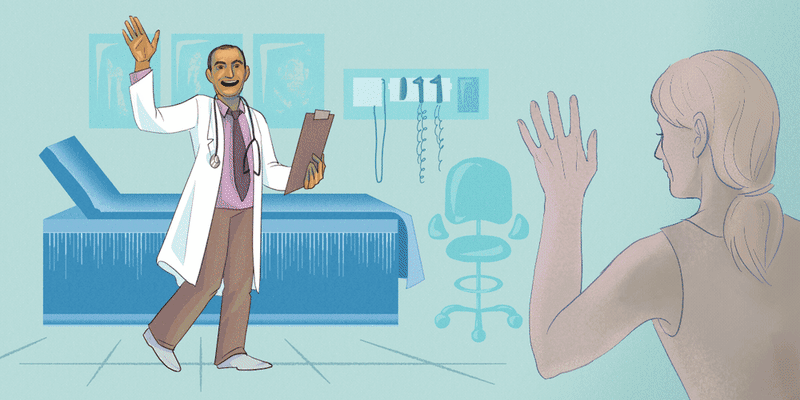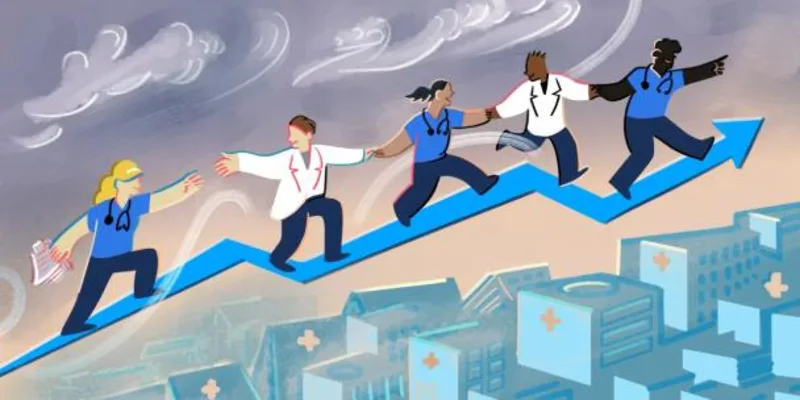The patient was someone known to us, seen in the psychiatric ER with some frequency. A middle-aged man with chronic psychotic illness, chronically homeless, chronically not taking medication, but not harming anyone. He had come into the ER complaining of stomach pain, a complaint that had to be sifted out of a jumble of psychotic speech, inoffensive but somewhat incomprehensible. As was protocol between the hours of 8 p.m. and 8 a.m., the patient had been “medically cleared” by the medical side of the ER before coming back to the psychiatric side, meaning that his complaint of abdominal pain had been deemed by the medical side to have been sufficiently worked up and treated as needed. Although his initial complaint had been abdominal pain, his psychosis was severe enough that he needed psychiatric help emergently. I evaluated him, he settled down with a blanket and food, and we set about taking care of his psychiatric needs.
Later in the night, however, he told one of the nurses his stomach was hurting. I looked through his documentation from the medical side of the ER, confirming that he had been cleared with no abnormal exam findings; he had not had any imaging or labs.
“Where is it hurting?” I asked.
He pointed to his stomach. I could read the pain on his face, although his responses to questions were incomprehensible.
"Do you mind if I feel your belly?”
He shook his head. I pressed gently on his stomach and immediately felt something underneath; I raised his shirt and came face to face with a fresh surgical wound, looking not the happiest, and an ostomy bag, clearly placed recently. I was shocked. What about that documented physical exam, with abdominal and skin marked “normal?” I thought to myself.
“Is this new?” I asked. He looked at me with pain and fear in his eyes and nodded.
“Did you have surgery? What happened?” But he wasn’t able to give me any more details. I went back to the team room. I looked with disbelief at the physical exam that was documented in the note from the medical side of the ER one more time. Abdominal exam: normal. Skin: normal. I combed through two consortium EMRs and finally found scattered information about a surgical hospitalization the prior week at an outside hospital. It was the small hours of the morning, but I called that hospital and eventually reached somebody who was able to provide me with information about his surgery, and that he had a follow-up appointment later that same morning. We made him as comfortable as we could, our social worker got him a cab, and we sent him straight to the follow-up appointment. I have little doubt that had we not done this, he never would’ve made it to that postop appointment, and the incision definitely looked like he needed it.
It is not at all rare for psychiatric patients to get substandard medical care, or for their medical concerns to be brushed off as psychiatric in nature. There are all kinds of reasons for this. Sometimes somatic symptoms stem from psychiatric illness, but there are also many times when these symptoms are entirely medical in nature. There are some psychiatric conditions that make it challenging for patients to organize their lives, making it difficult for them to schedule and attend medical appointments. Patients with severe mental illness have higher levels of poverty, unemployment, and homelessness, making it difficult to arrange things like transportation. Does that mean that they are any less deserving of medical care? Of equal medical care? Of course not. But that is often what happens.
Numerous studies highlight the disparity in health care for people with mental illness, particularly those with severe mental illnesses like schizophrenia. For example, in patients with diabetes, those with mental illness have been shown to have higher rates of ER visits, hospitalization, and mortality. It has been shown that there is higher mortality from a host of common preventable or treatable conditions. Of course, there could be greater risk or patient-centered factors leading to these outcomes. But studies have also found that there is less routine screening done for these populations and lower-quality treatment.
If people with psychiatric illness often receive substandard care, even worse off are marginalized groups in the population, including racial minorities, LGBT individuals, and people with substance use problems.
Second year of residency in a psychiatric hospital, I was in charge of both psychiatric and medical problems overnight. We had very little medical capability in the hospital, patients had to be transported to the medical hospital next door for even moderate medical complaints. I received a call overnight from a nurse on the dual diagnosis unit, which serves patients with both a substance use disorder and a primary psychiatric disorder.
“My patient has been saying all day that his stomach hurts,” the nurse said. “The attending this morning didn’t find anything wrong. We think he’s just trying to get pain meds, but could you come see him, please?” She sounded a little exasperated.
I came to talk to the patient and tried to listen to his entire history without prejudice or anchoring bias, although it’s impossible to forget information that was previously given to you. I performed a head-to-toe physical exam without findings. I couldn’t put a finger on what made me concerned, but the quality of the pain and exacerbating factors made me wonder about an acute issue, even though his symptoms didn’t match acute abdominal issues that fit his medical and substance use history. I sent him next door, despite the opposition of some of the staff who suspected malingering.
I got a call early the next morning from the ER doctor, which I had been expecting. What I wasn’t expecting was the diagnosis: a left lower lobe pulmonary embolism.
Although I had suspected something acute, you still could’ve knocked me over with a feather. His vitals and exam had been normal. I could not have been more thankful that I had followed my instincts even though I hadn’t reached a clear diagnosis. He grinned and sat up in bed when I visited him on his return.
“They don’t know why I had it, maybe because I smoke, maybe something runs in the family. But they were sure that going over there when you sent me saved my life. Could have died if I’d gone over any later.”
It can be tough to figure out if somebody’s actions and words have a psychiatric or a somatic etiology. To put it another way, it can be hard to figure out if a patient’s complaint is due to a manifestation of a mis-sense mutation in their gastric epithelium, or a manifestation of mis-wired signaling in the brain that is the biological underpinning of a psychiatric illness, be it mood, psychotic, or substance related. But this is one major reason why there is such gross morbidity in the psychiatric population. It is not only psychiatrists who must sift out when a patient’s physical symptoms are of somatic etiology. The onus is also on somatic doctors to clear any somatic cause of a complaint prior to settling on a psychiatric etiology. Something as simple as even a brief abdominal exam or skin assessment could save a life.
People of all ages both with and without psychiatric illness sometimes say things that are not based in reality, whether for conscious or unconscious reasons, both of which still have biological underpinnings — a more constructive way of observing such statements than simply terming them “lies.” I am certainly not innocent of having disbelieved a patient, suspected an ulterior motive to a complaint, or leapt to the conclusion that the reported symptoms were a manifestation of neuronal pathology in the brain rather than, say, an endocrine pathology in the adrenal glands. I am certainly not innocent of forgetting to work up all causes in the face of a severe mental illness; just as somebody with a complex genetic syndrome with multi-system manifestations may still have run-of-the-mill colon cancer or heart disease, so might a psychiatric patient have any old somatic illness. We are all subject to the same diseases, whether we have other obvious overarching conditions or not. While it often makes sense to look for horses and not zebras, conversely when there is a zebra it can sometimes be hard to remember to look for horses. And as someone who sees patients with not only zebras, but with herds of unicorns, centaurs, ibexes, and antelopes, I know it can be especially hard to remember to look for horses. But that’s what everyone deserves, whether psychiatrically ill or not, and it might just save a life.
Share a time when you caught a horse masquerading as a zebra in the comments.
Dr. Carolyn Rosinsky is a child/adolescent psychiatry fellow at Children's National Medical Center/George Washington University and completed her general psychiatry residency at University of Maryland/Sheppard Pratt. She is also a professional cellist and maintains an active career performing and teaching. Dr. Rosinsky is a 2021–2022 Doximity Op-Med Fellow.
All names and identifying information have been modified to protect patient privacy.
Illustration by April Brust







